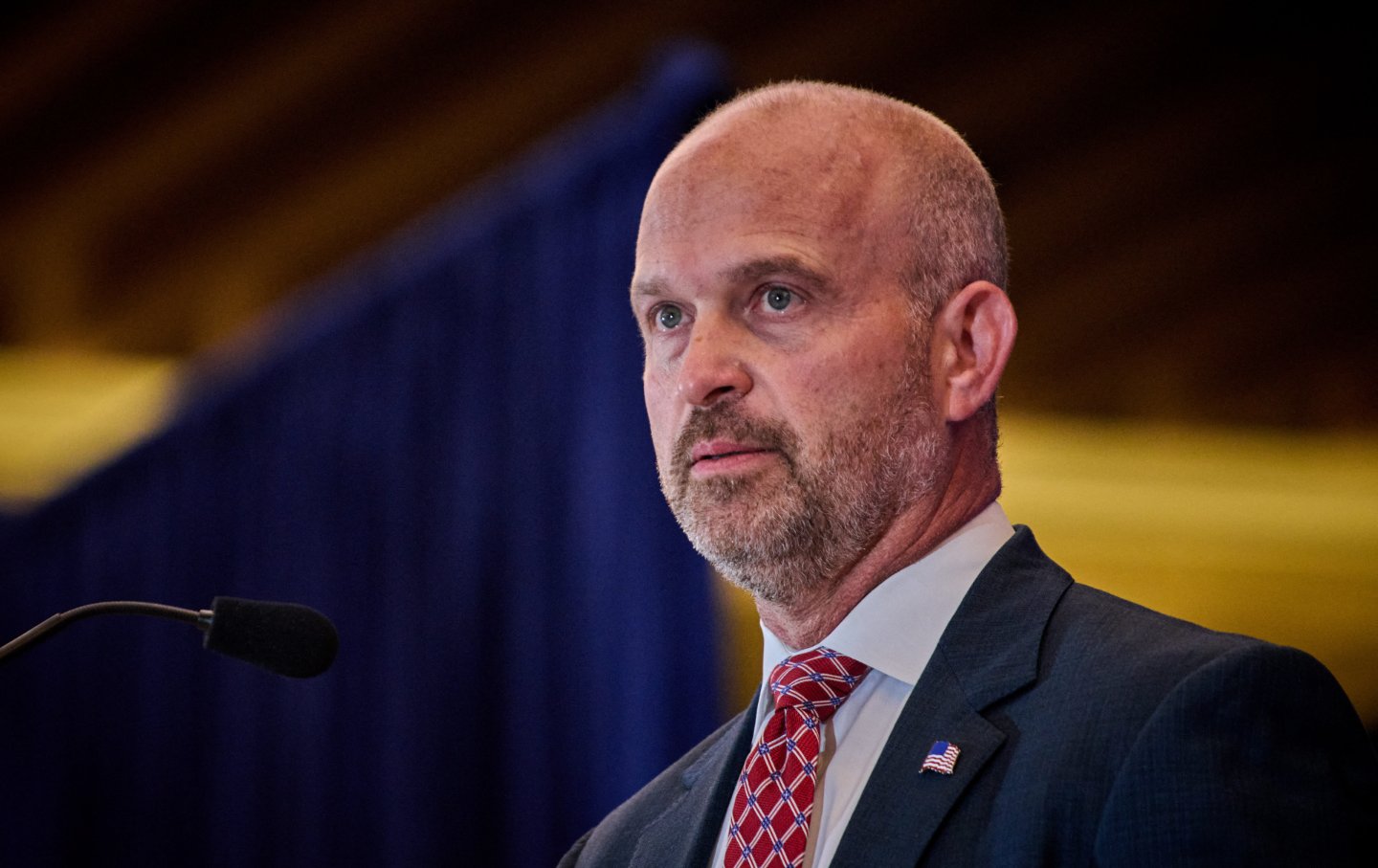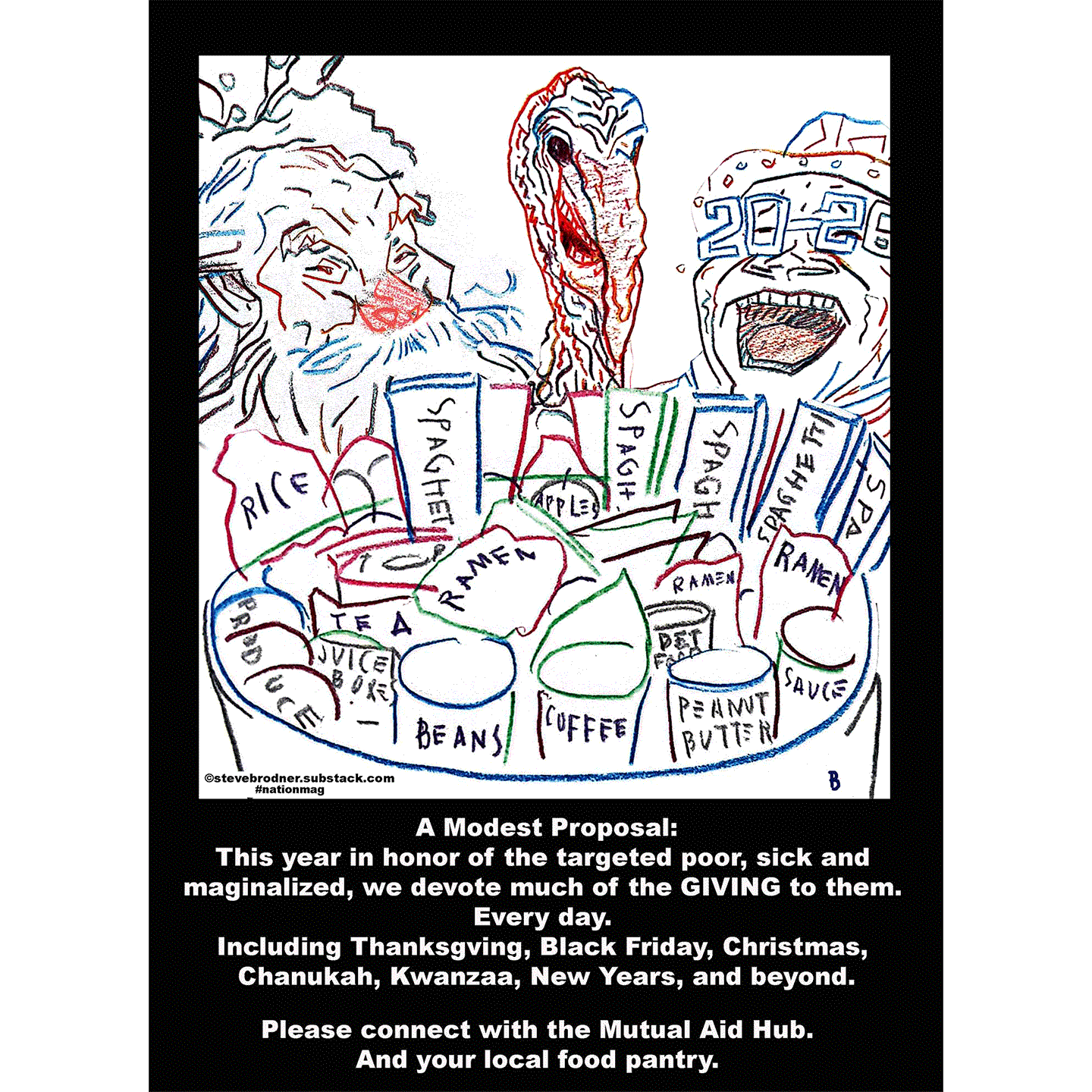I was one of the senator’s most dedicated consultants—until I saw a side of him that made me sick.
US Senator John Fetterman speaks during the grand opening of The Altneu Synagogue.
(Lev Radin / Getty Images)
Who is John Fetterman? A senator, a father, a husband, a stroke survivor, a hoodie-clad body double, an oaf, and recently, a Zionist who has cemented his name as a preeminent American mouthpiece for Israel’s genocide in Gaza.
For a very short period of time, on a very small number of platforms, I was also John Fetterman. Or at least, I was one of the people writing in his voice and pressing “Send” from his campaign-side social media accounts.
I only met the senator in person once or twice. I corresponded much more frequently with his wife, Gisele, whose warmth and sunny personality made her feel like a friend. By the end of my time working for Fetterman’s communications firm, the dregs of those warm feelings would be gone, replaced by a resentment so palpable that it drove me out of politics altogether.
But in the early days, I saw something in him that excited me: a candidate fluent in the informal parlance of the Internet; a man who flouted DC’s fancy suits and traditions; a politician who openly called for universal healthcare and labor rights on a national stage. For a year, it was a dream come true; the realization of a progressive, idealistic fantasy. I was 24, a young speechwriter, and I’d landed a job making memes, dunking on conservative chuds, writing statements about immigration and racial justice. Was there anyone luckier?
When Fetterman checked into the hospital to get treatment for his depression, my team and I were moved. We spun out a story about a vulnerable hero; a gentle giant breaking the stigma surrounding mental health treatment for American men. When conspiracy theories popped up online claiming that he was using a body double, we trolled them by selling T-shirts that read “John Fetterman’s Body Double” and “I Vote in This Hoodie.” And when all of this went live on social media, I was typing it out from my phone, from my laptop, on the subway, in the back of the bar, outside Lincoln Center, from the waiting room at the dentist. Back then, I could be John Fetterman at any moment, at the drop of a hat. Signal became my own personal Bat Signal. In my diary on Saturday, September 16, 2023, I wrote with enthusiasm: “Woke up and posted some UAW stuff for John—he’s heading to Detroit to join the picket line! Then mom and I worked out for a bit before we went to a sidewalk sale at the boutique Dress.” How embarrassing, in retrospect, to be so proud of so little.
Five decades before I wrote that entry, the real John Fetterman was born in Reading, Pennsylvania—a city best known for bringing the world Taylor Swift. He grew up in the suburbs of York, where he played football well enough to go DIII at Albright College down the road. It was an idyllic, All-American upbringing; in typical aw shucks fashion, Fetterman describes his younger self as a six-foot-eight “football-playing meathead.”
Then his life changed. In 1993, when he was 24, his best friend was killed in a car accident while on his way to pick him up. He decided he needed to turn his life around, to do something more meaningful in what he realized was a short time on earth. He joined Big Brothers Big Sisters of America, then Americorps. He got a masters degree from Harvard, then moved back down to his native Pennsylvania to set up shop in Braddock—the old, deindustrialized steel town which would in 2005 elect him mayor.
Fetterman’s 13 years as mayor of Braddock—and subsequent runs for lieutenant governor and the senate—turned him into something of a folk hero on the national scene. He had all the lore to suit the narrative: He turned around a rough-and-tumble town in the Rust Belt; he didn’t own a suit and tie; he lived in a converted car dealership; his wife ran a “free store,” redistributing goods to people in need. In 2018, The Washington Post ran a story singing “The ballad of Big John Fetterman,” a song whose lyrics laud him as “half Pete Seeger, half Metallica.” He spoke in charming Pennsylvania witticisms: “that winds my clock,” “jagoff,” “Yinz and Youse.” Soon he was on The Colbert Report, getting written up in New York magazine, eating with Anthony Bourdain, and campaigning on CNN.
By the time he went up against Dr. Oz for the Pennsylvania Senate seat in 2022, he was a national sensation. He ran as a progressive on a platform of raising the minimum wage, Medicare for All, criminal justice reform, and marijuana legalization. But he refused to perform the neoliberal formalities that seemed to signal “elite” to a growing number of voters. He was gruff; he wore Dickies and his trademark hoodie. He loved The Simpsons and the campaign ran with it, using it to bully Oz into cowering submission. Even Fetterman’s stroke in May of 2022 could not stop the victory train. He won the Senate race by five points that November, turning a formerly red seat blue. Folk hero or not, he became a hero to many folks watching the campaign from afar—including me.
I was primed to be a Fetterman fan. A few states south, in North Carolina, where I grew up, I had been knocking doors since I was 12 years old. While Fetterman was turning Braddock into America’s comeback kid, I was canvassing for Obama’s second campaign, then for the North Carolina midterms and special elections against Amendment 1: a proposed change to the state Constitution that would codify marriage as a union “between one man and one woman.”
By the end of college, I’d found my weird hyperfixation: a desire to become a speechwriter, a Sam Seaborn–style flack. For a serious, politically motivated young person who loved to write, there seemed to be no better fit. Sure, by now these were the Trump years, and things looked grim—but if there was a place left to fight, I would find it, and I’d wield my pen like a sword. I read every memoir, every guide, every item on the list that my mentors called “The Speechwriter’s Bookshelf.” I spent a summer on Counselor by Ted Sorensen, a thick brick of a book about his years working for JFK, and annotated my copy with sticky notes and red pen.
Sorensen typified a relationship that feels as quaint as his haircut: a life in service of his best friend and personal hero, where total loyalty and clear conscience were one and the same. After JFK’s assassination, Sorensen was adrift. “Jackie once told a reporter that I was like ‘a little boy in so many ways. He hero worships Jack,’” he wrote. “She was right; he was my hero. My loyalty was often called single-minded, and the most frequently quoted quip in the press was ‘When Jack’s injured, Ted bleeds.’” I couldn’t imagine anything more romantic. All I needed to become a knockoff Sorensen was to find a personal hero worthy of such dedication, a progressive rather than a feckless lib, and off we’d go, into the sunset to change the world.
Of course, political hero worship was always a liberal fantasy. For every JFK, there is a Vietnam; for every Sorensen, a dozen people of conscience who turned against their own savage empire. Under Kennedy, Sorensen helped wage a Cold War that terrorized the Third World and kept capitalist puppet regimes in power for their own geopolitical gain. He and his boss were openly antagonistic to the civil rights movement. They were enemies of revolutionaries in Cuba under a doctrine of so-called “Pro-Peace.”
In April 1961, Kennedy deployed 400 Special Forces troops to South Vietnam—their presence would escalate to more than 3 million by the war’s end. One former Kennedy staffer, the speechwriter Richard Goodwin, who went on to write LBJ’s “We Shall Overcome” speech, resigned from the White House in 1966 in opposition to the American atrocities in Vietnam. Almost immediately, he joined the anti-war movement and started speaking out. He wrote a book on the matter, Triumph or Tragedy, and published essays in The New Yorker, The New York Times, and Time
“We are buried in statements and speeches about negotiation and peace, the defense of freedom and the dangers of Communism, the desire to protect the helpless and compassion for the dying,” Goodwin is quoted in a 1966 New York Times article I have saved in my phone. “Much of it is important and sincere and well-meaning. Some is intended to deceive. Some is deliberate lie and distortion.”
Fetterman’s Vietnam came swiftly, over a period of days in October 2023 that set him on a collision course with history and left his entire staff ricocheting out in its wake. In the more than two years since October 7, he has become one of the most vocal supporters of Israel in any faction of American politics—ardently cheerleading Israel’s ensuing genocide in Gaza like an overgrown coed with a set of blue pom-poms. Every member of his team—chief, comms director, digital director, deputy comms—and a full roster of longtime advisers have deserted him at some point along the way.
But to the best of my knowledge, it started like this. On October 9, 2023, my coworkers and I woke up to a statement released from the Senate Office that junior staff on the campaign side had not seen. It ended with a line that continues to resound against the walls of my brain, even all this time later: “I also fully support Israel neutralizing the terrorists responsible for this barbarism.”
I remember reading the dog whistles “neutralize” and “barbarism” and feeling the room spin around me. Something in the tone had shifted; set me on edge. It sounded like a call to arms, a post-9/11 fervor. It was only set to get worse over the following week, as Fetterman did press junket after press junket defending Israel’s incessant rain of bombs, the collective punishment levied against a civilian population of Palestinians.
If on the outside, his statements sounded bleak, the picture on the inside was even worse. Our team was in disarray. “I worry it’s a ‘read the room’ moment,” I texted my boss after being asked to post photos of John at a labor event, or about the Menendez gold bars—his other obsession of the season. The air strikes on Gaza were increasing in frequency and severity. Residential buildings were being razed to rubble. “I don’t think it’s off,” she replied. I sat at the other end of the keyboard, waves of nausea crashing through my screen.
As a Fetterman voter I’m absolutely disgusted by the senator’s words against a ceasefire in Gaza. Sad to see my senator advocating for more bloodshed…
Every morning I was waking up—if I slept at all—to a wall of notifications like this one, from Instagram, Twitter, and Tiktok. The colors of each app whirred together like a pride flag from hell. I thought of the photos I’d posted of John and Gisele at Central Pennsylvania Pride just a few months earlier, smiling and draped in color. Now John was wearing the blue-and-white of the Israeli flag the same way, hanging it over his shoulders like a cape. That old meme of two war planes came to mind, one “Republican” and one “Democrat,” identical but for the latter’s rainbow decals.
What could I say? I was forbidden from replying to the messages; an e-mail came down from the Senate side reminding us of our obligation as staffers and consultants. You might disagree with his stance, the memo said, but “you cannot use your status as a current Fetterman staffer to undermine John’s positions or otherwise make a public statement that is inconsistent with John’s views.”
Need I recount the atrocities for you? Need I reduce them to crude legibility? The children giving a press conference in English, begging not to die; the boy gathering his brother’s limbs in a backpack; the father sobbing over his entire family’s shrouded bodies; a little girl passing down her accessories in a handwritten will; a tiny voice crying on the other end of the Red Cross line. What use were all those words about progress if they could do nothing to stop this? In fact, in a sick twist of irony, those words had enabled and legitimized this genocide by putting the obscene weight of a “mental health hero” behind it. Today, nearly half of Gaza’s children are suicidal; 96 percent say death feels “imminent.” Mental health, I thought to myself on the worst days. What a joke.
After a week, the situation seemed irredeemable. Fetterman had swallowed some awful blue pill, and suddenly he was asking staff to make Drake memes about rape. On October 16, 2023, I wrote in my diary: “Slept for a couple hours on the bathroom floor. Took the day off. I had a fever and was so depressed. I feel so at sea. Couldn’t keep anything down.”
October 17, 2023: “Back to work. So beyond depressed. Completely, utterly… A hospital in Gaza got bombed to the ground.”
October 18, 2023: “Everything changed today. Had a bunch of dumb meetings, was up late writing and early doing Nida [Allam] op-ed… Then John put out a statement that was so vile. ‘Now is not the time for a ceasefire.’ Awful… I tried to be normal but by end of day it hit me so hard and I couldn’t stop crying. I can’t be complicit in this. I can’t…. I’m done.”
I looked around at my colleagues, wondering who was writing these statements. Every single one of them became a suspect, a conspirator in this grand operation to betray voters, to spend their money on blowing up a hospital based on the ludicrous idea that Hamas was somewhere in the IVs. Fetterman aside, these were not stupid people. I knew some of my colleagues were against those early days of collective punishment. But I knew others were fueling the fire, pushing for pro-Israel statements to pick up perceived political points. My bosses took on his stances for the sake of loyalty, propriety, staff allegiance to principal, even their own personal beliefs.
Those bosses remain important people in the Democratic Party—trusted advisers and thought leaders with senior titles and high hourly rates. I’m sure many of them will scramble now to rid themselves of Fetterman’s residual “genocidal stench,” as one of my friends recently put it. They will claim, with all the comforts of hindsight, that it was impossible to see clearly how bad it would get. But they will be lying. It was clear to some of us from the very start.
Around October 19, former campaign staff put together a letter addressed to John. “These are not the values that we believed you to hold, and these are not our values,” they wrote. “On the trail, your overarching promise was to ‘Forgotten Communities’—people and places that get overlooked, written off, and left behind. You can’t be a champion of forgotten communities if you cheerlead this war and the consequent destruction of Palestinian communities at home and abroad. We are speaking out now because we played important roles in electing you. We cannot in good conscience stay silent at this moment.”
October 20, 2023, from my diary again: “I want to fucking die. I’m gonna quit. Frazzled! Fiona came over. Hadn’t eaten or showered. I looked awful. We ate and got groceries.… I’d rather lose my money than my conscience.”
I wrote my resignation letter. I gave my notice. I had no other job lined up. At home, Ted Sorensen glared at me from the shelf.
Since early 2024, Fetterman has publicly expressed disdain with “disgruntled former staff” who “hide behind unnamed sources in articles.”
“Let’s get back to killing,” he has reportedly said of the genocide. “Kill them all.”
I am not an important person—I was junior staff at a third-party communications firm, replaceable in the most concrete way. I was not a visible appointee like Lily Greenberg Call or Craig Mokhiber. But there are hundreds like me—nameless young nobodies who assumed the identities of more powerful people until we couldn’t hold our noses any longer. Hopeful strivers who refused to submit to the banality of evil. Did it work? Did it make any sort of tangible difference, to throw this tiny wrench in a machine?
For two years, I’ve repeated the beats of taking, working, and quitting this job in my head, wondering if I could have done more, sooner, to change the awful trajectory of Fetterman’s descent, and that of his progressive-except-for-Palestine peers, other clients of ours across the Democratic Party. I’ve gaslighted myself, told myself again and again that I must be a “quitter,” a naïve putz like most of my generation apparently is, incapable of withstanding hard things. Zoomers have been called “Generation Quit,” after all; I told myself that I was just another dimwitted example. Didn’t all the evidence point that way? Fetterman’s former chief of staff Adam Jentleson all but said so in the pages of The New York Times, where he bemoaned a “polluted” talent pipeline deluded enough to think that we could “change the system when it produces results [we] don’t like.” “Call for a ceasefire,” a Twitter user replied to Jentleson in October 2023; “no,” he replied, all lowercase, with no punctuation. I hated the idea that I was somehow proving him right.
But looking back, thinking of Goodwin, and my peers around the world fighting for a free Palestine, I know I wasn’t naïve. I was under no illusions that politics would be perfect, that I would never have to compromise. I was willing—happy, even!—to work long hours and weekends for pay that only went so far in New York City. I knew I’d never agree with every politician on everything. They were politicians, of course, narcissistic enough to subject themselves to the level of scrutiny required to run for office. But my red line was genocide. There’s nothing naïve about that at all.
As I no longer work for Fetterman, I’m no longer able to read his communications, but I am certain the DMs from his disenchanted voters have not stopped. Clearly, I am not the only person to find herself disillusioned with Fetterman, even if not on such intimate terms. The intensity of this disgust extends beyond one man or one office; it affects a generation of political talent that thought we could do things differently, that believed we were there to buck the establishment, only to find out that there were limits to the revolution we imagined—that progressivism, for most of the Democratic Party, was more posture than praxis.
And so we suffer, the world over, the consequences of a lazy and self-absorbed Democratic party dead-set on “playing dead.” Elected officials who would rather become the villain than take off the cape altogether. When Kamala Harris lost the 2024 election, I was not surprised in the slightest. After all, who was left but the hacks, centrists, and grifters to work her campaign? The rest of us, “the groups” as Jentleson nebulously put it, the “magical thinkers,” the purists who simply could not stomach slaughtering 66,000 and counting were told, in so many words, to put up or shut up. The Fettermans of the world have cut off their own feet, and then gleefully rolled about on the floor, wondering why on earth they cannot walk.
The trouble for him is, I’m not a foot any longer—and what’s more, feet are not a renewable resource. The old politics of cynicism, complicity, and unyielding hierarchy are dying; a new left is rising, insurgent, in their void. Look no further than Zohran Mamdani’s historic win to see proof that one need not sacrifice Palestinians or trans people at the altar of political expediency; that one can be a proud, self-identifying Democratic Socialist and pull off the greatest political upset in a generation not in spite, but because of it. In fact, contrary to the stagnant center-right philosophy of complacency, the only way to sustain political faith is by being for something in the first place. “This new age,” Mamdani roared Tuesday night in his victory speech, “will be defined by a competence and a compassion that have too long been placed at odds with one another.” If Fetterman and the rest of the Democratic establishment are to recover a semblance of oppositional power under Trump, it will be by embracing the very duality they’ve long denied—though, honestly, I’m not holding my breath.
Half a year after I quit working for Fetterman, in June of 2024, he would compare himself to The Joker in a conversation with The New Yorker’s Benjamin Wallace-Wells. “It’s like in Batman—the original one, with Jack Nicholson,” he said. “I’ve already been dead once. It’s very liberating.” It’s tempting just to leave it there. But I know better now. I would never let a villain get the last word.
More from The Nation

Despite the attempts by so many in the party’s establishment to paint trans rights as a toxic issue, transphobia was soundly rejected across the country this week.












:quality(85):upscale()/2025/03/21/754/n/1922195/59914bba67dd9c6e0a60d9.90352372_.png?w=150&resize=150,150&ssl=1)
